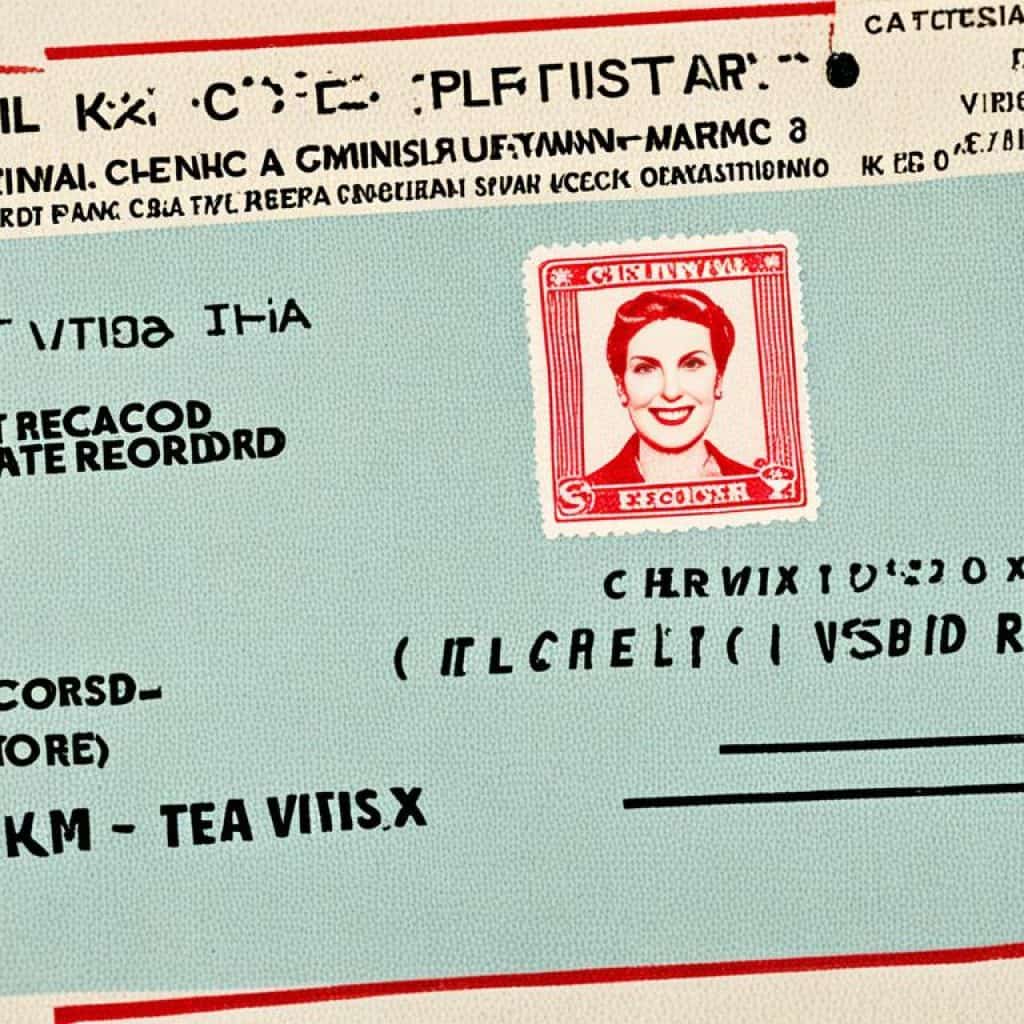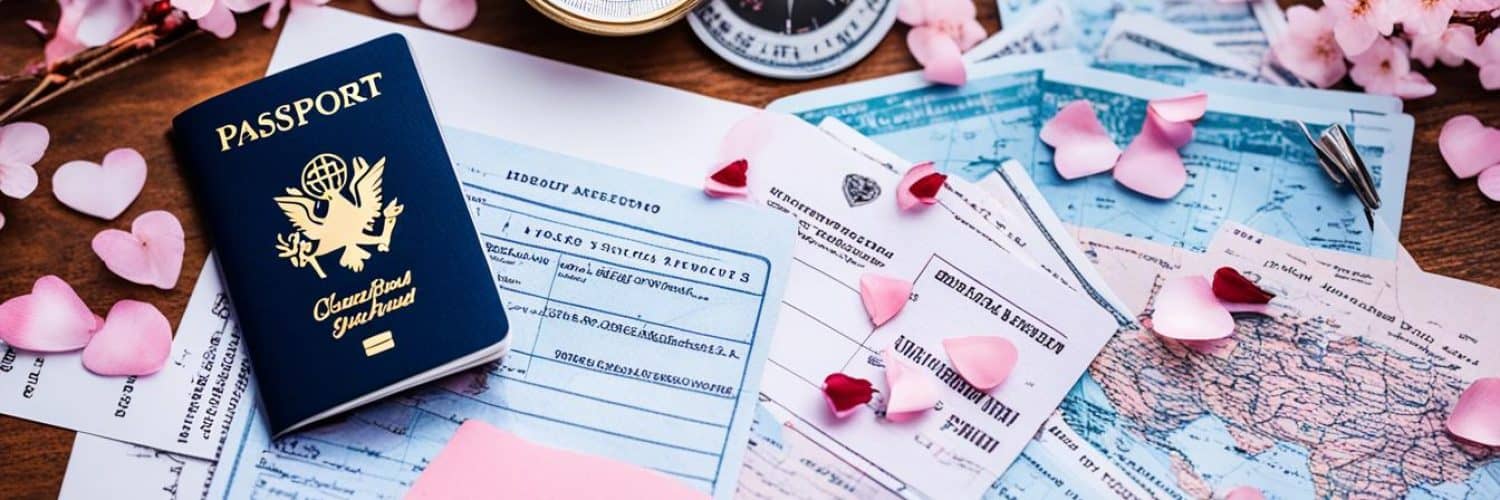Are you in a relationship with a foreign-born fiancé and dreaming of a life together in the United States? But you’re not sure where to start or how to navigate the complex K-1 visa process? Don’t worry, we’ve got you covered! In this comprehensive guide, we will walk you through everything you need to know about the K-1 visa, from the requirements and application process to the interview and beyond. Get ready to embark on this exciting journey with confidence!
Key Takeaways:
- Understand the K-1 visa requirements and process.
- Prepare for the K-1 visa interview and gather the necessary documents.
- Learn about the possible outcomes of the interview.
- Discover the timeline from K-1 visa application to obtaining a green card.
- Budget for the costs associated with the K-1 visa and green card application.
- Understand the role of the U.S. citizen fiancé as the sponsor in the process.
- Learn about the reasons for K-1 visa denial and the next steps.
K1 Visa Process: From Application to Interview
The K-1 visa process is a crucial step for foreign-born fiancés of U.S. citizens who wish to reside in the United States. This section provides a comprehensive overview of the K1 visa process, from the initial application to the all-important interview.
1. Form I-129F: The Petition for Alien Fiancé(e)
The journey to obtaining a K-1 visa starts with the completion and submission of Form I-129F, commonly known as the “Petition for Alien Fiancé(e)”. This form is filed by the U.S. citizen sponsor on behalf of their foreign-born fiancé. It collects essential information about the couple’s relationship, background, and eligibility for the K-1 visa.
2. USCIS Processing Time
After the successful submission of Form I-129F, the case is forwarded to U.S. Citizenship and Immigration Services (USCIS) for processing. The USCIS typically takes 14-19 months to review and adjudicate the application. During this time, USCIS verifies the authenticity of the relationship and checks if all necessary supporting documents have been provided.
3. Approval and Notification
Upon approval of the Form I-129F, the applicant will be notified of the interview date, time, and location at their local U.S. embassy or consulate. This notification marks an important milestone in the K-1 visa process, as it signifies that the USCIS has determined the relationship to be genuine and eligible for further assessment.
4. K1 Visa Interview: Proving the Authenticity of the Relationship
The K1 visa interview is a critical stage where the consular officer assesses the authenticity of the relationship between the U.S. citizen sponsor and the foreign-born fiancé. During the interview, both individuals will be asked a series of questions to verify the details provided in the visa application. The goal is to ensure that the relationship is genuine and not entered into solely for the purpose of obtaining immigration benefits.
In preparation for the K1 visa interview, it is essential to gather and bring all required documents to support the authenticity of the relationship. These may include photographs, communication records, travel itineraries, engagement and wedding plans, and any other evidence that demonstrates the bona fide nature of the relationship.
| Key Steps | Details |
|---|---|
| Step 1: Complete and submit Form I-129F | Provide accurate information about the relationship and personal details of both the U.S. citizen sponsor and the foreign-born fiancé |
| Step 2: USCIS Processing | Wait for USCIS to process the application, which usually takes 14-19 months |
| Step 3: Approval and notification | Receive notification of the interview date, time, and location |
| Step 4: K1 Visa Interview | Present all necessary documents and answer questions to prove the authenticity of the relationship |
Successfully navigating the K1 visa process requires thorough preparation, attention to detail, and adherence to the requirements and guidelines set forth by USCIS. By following these steps, couples can increase their chances of a successful outcome and pave the way for a future together in the United States.
K1 Visa Interview: Preparation and Documentation
Preparing for the K-1 visa interview is crucial to ensure a smooth and successful process. In this section, we will discuss the necessary documentation that applicants need to gather and bring for their interview.
Required Documents for the K1 Visa Interview
During the K-1 visa interview, it is important to bring the following documents:
- DS-160 confirmation page: This is the confirmation page that applicants receive after completing the DS-160 online application form.
- Valid passport: The passport must be valid for at least six months beyond the intended period of stay in the United States.
- Birth certificate: This document provides proof of the applicant’s identity and date of birth.
- Divorce or death certificates (if applicable): If the applicant was previously married, they must provide divorce or death certificates to establish their eligibility for the K-1 visa.
- Police certificates: These certificates are required to demonstrate that the applicant does not have a criminal record.
- Medical exam documentation: Applicants must undergo a medical examination by an approved physician and bring the documentation to the interview.
- Form I-134 (Affidavit of Support): This form is completed by the U.S. citizen sponsor and demonstrates their ability to financially support the applicant during their stay in the United States.
- Photographs: The applicant should bring two identical passport-sized photos that meet the specifications provided by the U.S. embassy or consulate.
In addition to the required documents, it is also important to provide evidence of the relationship with the U.S. citizen fiancé(e). This can include photographs, a timeline of the relationship, and any mementos that showcase the genuine nature of the relationship.
By gathering and organizing these documents ahead of time, applicants can ensure that they are well-prepared for the K-1 visa interview and increase their chances of a successful outcome.

K1 Visa Interview Questions: What to Expect
- How did you and your fiancé meet?
- Where did you have your first dates?
- Can you share your engagement story?
- How long have you been engaged?
- What are your plans for living together in the United States?
While these are just a few examples, it’s important to note that the consular officer may ask additional questions based on your personal circumstances. It is crucial to provide truthful and confident answers, even if you need to look up certain details during the interview.
Avoid providing vague or inconsistent answers, as this may raise concerns about the authenticity of your relationship. If you have any supporting documents or evidence that can validate your answers, it’s a good idea to bring them along to the interview.
Remember, the purpose of the interview is to ensure that your relationship is genuine and that you meet the requirements for the K1 visa. By preparing in advance and being honest during the interview, you can increase your chances of a successful outcome.
| K1 Visa Interview Questions | What to Prepare |
|---|---|
| How did you and your fiancé meet? | Be ready to provide a detailed account of how you met, including any online or offline interactions. |
| Where did you have your first dates? | Have the exact locations and dates of your first dates ready. |
| Can you share your engagement story? | Prepare a heartfelt and genuine story of your engagement, including how and where it took place. |
| How long have you been engaged? | Know the duration of your engagement, including the exact date of the proposal. |
| What are your plans for living together in the United States? | Prepare a clear and realistic plan for your future living arrangements, such as where you intend to reside and how you will support yourselves. |
K1 Visa Interview Outcome: Approval or Denial
After the K-1 visa interview, applicants anxiously await the outcome, which can result in one of three possible scenarios:
- Immediate Approval
- Request for Additional Evidence
- Denial with Opportunity for Submission of More Evidence
Immediate approval is every applicant’s desired outcome, as it leads to the issuance of the K-1 visa, allowing the couple to move forward with their plans to marry and live in the United States. However, not all interviews yield immediate approval.
“The K-1 visa interview is a crucial step, and consulate officers thoroughly review each case before making a decision. It is important to approach the interview with confidence and provide genuine, verifiable evidence of your relationship to enhance your chances of approval.”
If the consular officer requires further evidence to verify the authenticity of the relationship, they may issue a Request for Additional Evidence (RFE). This gives applicants the opportunity to submit additional documents or conduct further interviews to establish the legitimacy of their relationship.
Unfortunately, not all interviews end in approval or a request for additional evidence. Some applicants may receive a denial. There can be various reasons behind a K-1 visa denial, including:
- Prior serious criminal charges
- Insufficient evidence of a genuine relationship
Dealing with a denial can be disheartening, but it doesn’t necessarily mean the end of the journey. Applicants have the opportunity to reapply and submit additional evidence to strengthen their case.
K1 Visa Interview Outcome
| K1 Visa Interview Outcome | Description |
|---|---|
| Immediate Approval | Applicant receives immediate approval of their K-1 visa during the interview, allowing them to proceed with their plans to marry and live in the United States. |
| Request for Additional Evidence | The consular officer requires further evidence to verify the authenticity of the relationship. Applicants are given the opportunity to submit additional documents or undergo further interviews. |
| Denial with Opportunity for Submission of More Evidence | The consular officer denies the K-1 visa application but provides the opportunity for applicants to reapply and submit additional evidence to strengthen their case. |
Dealing with a K-1 visa denial can be challenging, but with perseverance and the proper guidance, couples can overcome the obstacles and reapply with a stronger case.
Dress Code and Legal Representation at the K1 Visa Interview
While there is no official dress code for the K-1 visa interview, it is recommended to dress presentably. The interview is a formal occasion, and dressing professionally can create a positive impression. Your attire should reflect respect for the process and the officials conducting the interview. While the focus should be on your relationship and eligibility for the visa, dressing appropriately can help convey that you take the interview seriously and are prepared for this important step in your journey.
Although it is not necessary to hire an attorney for the K-1 visa interview, consulting with one before the interview can provide valuable guidance and ensure preparedness. An experienced immigration attorney can help you understand the interview process, anticipate possible questions, and advise you on appropriate responses. They can review your application and supporting documents, ensuring that everything is in order and prepared for the interview. While legal representation is optional, it can be beneficial, especially if you have concerns or unique circumstances that require professional assistance.
If, for any reason, you are unable to attend the K-1 visa interview, it is crucial to contact the consulate or embassy as soon as possible. They may be able to reschedule the interview if you provide a valid reason for your absence. It is important to communicate promptly and provide any necessary documentation to support your request for a rescheduled interview. Failure to notify the consulate or embassy may lead to delays or even denial of your visa application.
Remember, the K-1 visa interview is a significant step toward starting your life together with your fiancé(e) in the United States. Dressing appropriately and seeking legal guidance if necessary can help ensure a smooth and successful interview process.
Key Points:
- There is no official dress code for the K-1 visa interview, but dressing presentably is recommended
- Legal representation is not required, but consulting with an attorney beforehand can provide guidance
- If unable to attend the interview, contact the consulate or embassy promptly

K1 Visa Timeline: From Application to Green Card
Obtaining a K-1 visa and eventually a green card is an exciting journey for couples looking to build their future in the United States. Understanding the timeline of the K-1 visa process and the subsequent steps towards a green card is crucial for planning and preparation.
The K-1 visa timeline typically involves 14-19 months for application processing. Once the application is approved, the foreign-born fiancé can enter the United States within 6 months of receiving the visa. It is important to note that the K-1 visa is only valid for 90 days upon entry into the country, during which time the couple must tie the knot.
“The K-1 visa provides a window of opportunity for couples to get married within 90 days of the foreign-born fiancé’s entry into the United States. It’s a time for celebration and laying the foundation for a life together.”
Once married, the couple can begin the process of applying for a green card through the Adjustment of Status (AOS) process. This involves submitting additional documentation and fees to the U.S. Citizenship and Immigration Services (USCIS).
The entire process of obtaining a green card from the initial application to approval can take around 12.5 months. It is important to be proactive, organized, and patient throughout this process to ensure a smooth transition to permanent residency in the United States.
K1 Visa to Green Card Timeline:
| Stage | Duration |
|---|---|
| K-1 Visa Application Processing | 14-19 months |
| K-1 Visa Issuance & Entry into the United States | Within 6 months of visa issuance |
| Marriage & Adjustment of Status (AOS) Application | – |
| AOS Processing & Green Card Approval | Around 12.5 months |
Embarking on a new chapter in life with your loved one is a momentous occasion. Being well-informed about the K-1 visa timeline and the subsequent journey towards a green card can help couples navigate the process with confidence and ease.
K1 Visa Cost: Fees and Expenses
When applying for a K-1 visa and navigating the immigration journey, it’s essential to consider the associated fees and expenses. Understanding the cost involved will help you budget accordingly and plan for a smoother process. The total cost of the K-1 visa and green card application is approximately $2025.
Here’s a breakdown of the expenses:
K1 Visa Application Fee
The initial K-1 visa application fee amounts to around $1000. This fee covers the processing and evaluation of your petition, including background checks and administrative costs.
Adjustment of Status Fee
Once you enter the United States on a K-1 visa and marry your U.S. citizen fiancé within 90 days, you’ll need to apply for a green card through the Adjustment of Status (AOS) process. This process incurs additional fees.
Here’s an approximate breakdown of the Adjustment of Status fees:
- I-485 Application Fee: $1225
- I-131 Advance Parole Fee (optional): $575
- I-765 Employment Authorization Document (EAD) Fee (optional): $550
Keep in mind that these costs are estimates and subject to change. It’s important to consult the official U.S. Citizenship and Immigration Services (USCIS) website for the most up-to-date fee information.
Properly budgeting for the K-1 visa cost will help you avoid unnecessary financial stress and ensure that you have the funds necessary to complete the process successfully.
K1 Visa Sponsor: Roles and Responsibilities
In the K-1 visa process, the U.S. citizen fiancé plays a crucial role as the sponsor or petitioner. They have specific responsibilities that they must fulfill to support their non-U.S. citizen fiancé throughout the application and interview process.
âBecoming a K-1 visa sponsor is more than just a titleâitâs a commitment to your relationship and future together.â
As the sponsor, the U.S. citizen fiancé is responsible for:
- Completing and filing Form I-129F: The sponsor must accurately complete and submit Form I-129F, the “Petition for Alien Fiancé(e)”. This form serves as the official request for a K-1 visa.
- Providing evidence of citizenship: The sponsor must demonstrate their U.S. citizenship by submitting relevant documents, such as a copy of their U.S. passport or birth certificate.
- Financial support: The sponsor needs to submit Form I-134 (Affidavit of Support), which proves that they have the financial means to support their fiancé in the United States.
- Assisting with documentation: The sponsor should assist their fiancé in gathering and organizing the required documentation, ensuring all forms and supporting materials are completed accurately.
- Offering emotional support: Throughout the application process, the sponsor should provide emotional support and reassurance to their fiancé. Navigating the immigration journey can be challenging, and having a supportive partner makes a significant difference.
By fulfilling their responsibilities as a K-1 visa sponsor, the U.S. citizen fiancé demonstrates their commitment to their relationship and their determination to begin a new life together in the United States.
The Importance of Financial Support
Financial support is an essential aspect of the K-1 visa process. It demonstrates that the U.S. citizen fiancé has the means to provide for their non-U.S. citizen fiancé’s essential needs, ensuring they will not become a public charge. To meet this requirement, the sponsor must submit Form I-134, which serves as a financial undertaking.
Form I-134 includes information about the sponsor’s income, assets, and liabilities. It serves as a legal contract between the sponsor and the U.S. government, stating that the sponsor is responsible for financially supporting their fiancé for a certain period.
Sample I-134 Document
| Sponsor Name: | John Smith |
|---|---|
| Annual Income: | $60,000 |
| Assets: | $80,000 house, $20,000 savings |
| Liabilities: | $30,000 mortgage, $10,000 car loan |
Completing and submitting Form I-134 accurately and honestly is crucial. Any falsified or misleading information may lead to serious consequences, including visa denial.
Remember, being a K-1 visa sponsor is a significant responsibility. It requires dedication, careful documentation, and a genuine commitment to building a life together in the United States.
K1 Visa Denial: Reasons and Next Steps
Although the K-1 visa process is designed to bring together genuine couples, there are instances where the application may be denied. The consular officer carefully evaluates the evidence and may deny the visa if there are significant doubts about the authenticity of the relationship or if the petitioner has a history of serious charges.
Being denied a K-1 visa can be disheartening, but it does not mean the end of the journey for the couple. The next steps involve considering whether to reapply and how to strengthen the case with additional evidence.
Here are some common reasons for K-1 visa denial:
- Lack of convincing evidence: If the consular officer is not convinced that the relationship is genuine, they may deny the visa. This could be due to inconsistencies in the couple’s statements, lack of clear proof of shared life, or insufficient documentation.
- Prior serious charges: If the petitioner has a criminal record or history of serious charges, it can raise concerns about their credibility and the validity of the relationship. This could include offenses such as fraud, domestic violence, or drug-related crimes.
- Insufficient financial support: The petitioner must demonstrate the ability to financially support their fiancé(e) in the United States. If there is doubt about the petitioner’s financial stability, it may lead to visa denial.
Despite the initial denial, couples have the option to reapply and address the reasons for denial. It is crucial to thoroughly evaluate the reasons for the denial and gather additional evidence to strengthen the case.
Next Steps after K-1 Visa Denial:
If the K-1 visa is denied, couples can take the following steps to improve their chances of approval:
- Review the denial letter: Carefully review the denial letter provided by the consular officer. Understanding the specific reasons for the denial can help identify areas that need improvement.
- Gather additional evidence: Collect compelling evidence to address the reasons for denial. This could include updated photographs, detailed statements from friends and family about the relationship, joint financial documents, and any other documentation that proves the authenticity of the relationship.
- Submit a new petition: Once adequate evidence has been gathered, couples can reapply by submitting a new Form I-129F and paying the required fees. It is essential to provide a comprehensive response to address the previous concerns.
- Prepare for the interview: If the reapplication is accepted, the couple will need to attend a new K-1 visa interview. Prepare thoroughly by reviewing common interview questions and ensuring all supporting documents are organized and readily available.
By taking the necessary steps and presenting a stronger case, couples can increase their chances of a successful K-1 visa application. It is crucial to address the reasons for denial and provide compelling evidence to demonstrate the authenticity of the relationship.

| Reasons for K-1 Visa Denial | Next Steps |
|---|---|
| Lack of convincing evidence | Review denial letter Gather additional evidence Submit a new petition Prepare for the interview |
| Prior serious charges | Review denial letter Gather additional evidence Submit a new petition Prepare for the interview |
| Insufficient financial support | Review denial letter Gather additional evidence Submit a new petition Prepare for the interview |
K1 Visa Interview Questions: Sample Questions for Preparation
Preparing for the K1 visa interview is essential for a successful outcome. One key aspect of interview preparation is familiarizing yourself with the types of questions that may be asked. While each interview is unique, here are some sample K1 visa interview questions to help you practice and feel more confident:
- How did you and your fiancé(e) meet?
- Where were your first dates together?
- Can you describe the details of your engagement?
- How long have you been engaged?
- What are your plans for living arrangements once you arrive in the United States?
Remember, these are just a few examples of the questions the consular officer may ask during the K1 visa interview. It’s important to prepare thoughtful and truthful responses based on your own unique relationship and experiences. As you practice answering these questions, try to provide specific details and demonstrate the authenticity of your relationship.
For more comprehensive information on the K1 visa interview process and to learn about other potential questions, consult with an experienced immigration attorney or refer to authoritative immigration resources.
K1 Visa Documentation: Essential Documents for the Interview
When preparing for your K-1 visa interview, it’s crucial to gather and organize the required documents. Providing the necessary paperwork not only helps prove the authenticity of your relationship but also ensures a smooth and successful interview process. Here is a list of essential documents you should bring:
- Form DS-160 Confirmation Page: This is the application form that you submitted online and received a confirmation page.
- Valid Passport: Make sure your passport is current and will remain valid throughout the visa process.
- Birth Certificate: Provide a copy of your birth certificate to verify your identity.
- Divorce or Death Certificates (if applicable): If either you or your fiancé have been previously married, provide the necessary documents to show the termination of any previous marriages.
- Police Certificates: Obtain police certificates from all the countries where you have lived for more than six months since the age of 16.
- Medical Exam Documentation: Complete the required medical examination and bring all the relevant documentation to the interview.
- Form I-134 (Affidavit of Support): The U.S. citizen fiancé should submit this form to demonstrate their ability to financially support you during your stay in the United States.
- Photographs: Provide recent photographs that meet the specific requirements outlined by the U.S. embassy or consulate.
- Evidence of the Relationship: Compile evidence that demonstrates your genuine relationship, such as photographs together, travel itineraries, communication records, and other relevant mementos.
By ensuring you have all the necessary documents ready and organized, you can confidently approach your K-1 visa interview and increase your chances of success.
Conclusion
Throughout the journey, it is important to seek assistance from immigration professionals and stay informed about any updates or changes in the process. Being proactive and well-prepared can help make the entire K-1 visa process smoother and more manageable.
Remember, the key to a successful K-1 visa application is providing authentic and compelling evidence of your relationship. Collect all the necessary documents, including the DS-160 confirmation page, birth certificates, police certificates, and photographs, to support your application.
FAQ
What is a K-1 visa?
A K-1 visa is issued to the foreign-born fiancé of a U.S. citizen, allowing them to enter and reside in the United States.
What is the process for obtaining a K-1 visa?
The process begins with the completion and submission of Form I-129F, the “Petition for Alien Fiancé(e)”, followed by an interview at the local U.S. embassy or consulate to prove the authenticity of the relationship.
What documents are required for the K-1 visa interview?
Essential documents include the DS-160 confirmation page, valid passport, birth certificate, divorce or death certificates (if applicable), police certificates, medical exam documentation, Form I-134 (Affidavit of Support), photographs, and evidence of the relationship.
What questions are asked during the K-1 visa interview?
The consular officer may ask about how the couple met, their first dates, engagement story, duration of the engagement, and future living arrangements.
What are the possible outcomes of the K-1 visa interview?
The outcomes can be immediate approval, request for additional evidence, or denial with the opportunity to submit more evidence.
Is there a dress code for the K-1 visa interview?
While there is no official dress code, dressing presentably is recommended.
Do I need an attorney for the K-1 visa interview?
It is not necessary to hire an attorney, but consulting one beforehand can provide guidance and ensure preparedness.
What is the timeline for the K-1 visa process?
The process typically takes 14-19 months for application processing and entry into the United States must occur within 6 months of visa issuance. Obtaining a green card can take around 12.5 months.
How much does the K-1 visa application cost?
The total cost is approximately $2025, which includes around $1000 for the initial K-1 visa application and additional fees for the Adjustment of Status process.
What is the role of the U.S. citizen sponsor in the K-1 visa process?
The sponsor completes and files Form I-129F, provides evidence of their citizenship, and supports the non-U.S. citizen fiancé throughout the application and interview process.
What are the reasons for K-1 visa denial?
Denial may occur if the consular officer believes the relationship is not genuine or if the petitioner has a history of serious charges.
What should I do if my K-1 visa is denied?
In case of denial, the couple may choose to reapply and submit additional evidence to strengthen their case.
Can you provide sample K-1 visa interview questions?
Sample questions include inquiries about how the couple met, where their first dates took place, details of the engagement, duration of the engagement, and future living arrangements.
What are the essential documents for the K-1 visa interview?
Essential documents include Form DS-160 confirmation page, valid passport, birth certificate, divorce or death certificates (if applicable), police certificates, medical exam documentation, Form I-134 (Affidavit of Support), photographs, and evidence of the relationship.








Add comment